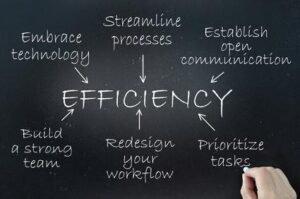Maximizing Business Efficiency: A Comprehensive Guide to ERP Systems and Their Benefits
With the rapid pace of technological advancements, businesses are continually seeking efficient ways to streamline their operations and make data-driven decisions. One solution that stands at the forefront of this revolution is Enterprise Resource Planning (ERP) systems. This article provides an in-depth understanding of how ERP systems function, their benefits, and how they can maximize your business efficiency.
Understanding ERP Systems
An ERP system is a suite of integrated applications that manage and integrate a company’s financials, supply chain, operations, reporting, manufacturing, and human resource activities. Most ERP systems also incorporate customer relationship management (CRM), making it a one-stop solution for business management and growth.
Benefits of ERP Systems
Improved Business Reporting
With ERP systems, businesses can generate comprehensive reports with ease. This means easier access to data and therefore, better and faster decision-making processes.
Increased Operational Efficiency
ERP systems eliminate redundant processes, greatly reducing the amount of manual labor. They also improve efficiency by integrating all business operations, making communication and collaboration easier.
Better Customer Service
Through integrated CRM, ERP systems provide businesses with a better understanding of their customer needs, enabling them to offer personalized customer experiences.
The Role of ERP Systems in Maximizing Business Efficiency
By integrating all business operations, ERP systems help businesses run smoothly. With improved data access, businesses can make strategic decisions that enhance productivity and profitability.
Case Study: ABC Manufacturing
ABC Manufacturing, a medium-sized enterprise, was struggling with inefficiencies due to the use of disparate systems for different operations. After implementing an ERP system, they reported a 30% increase in efficiency and a significant improvement in customer service. This real-life scenario underscores the power of ERP systems in transforming businesses.
Tips for Implementing an ERP System
While implementing an ERP system can be transformative, it requires careful planning and execution. Here are some tips to help ensure a successful ERP implementation:
– Choose the right ERP system that aligns with your business needs.
– Involve all stakeholders in the decision-making process.
– Train your employees on how to use the ERP system.
– Regularly update and maintain your ERP system.
Conclusion
ERP systems have become a cornerstone in the digital transformation journey of businesses. Through integration and automation, they maximize business efficiency, leading to improved profitability and growth. Therefore, investing in an ERP system could be one of the best decisions a business can make to not only survive but thrive in this digital era.






